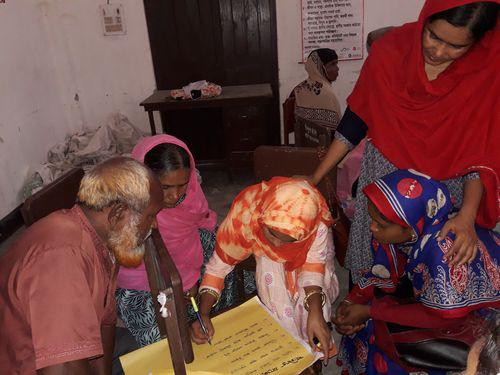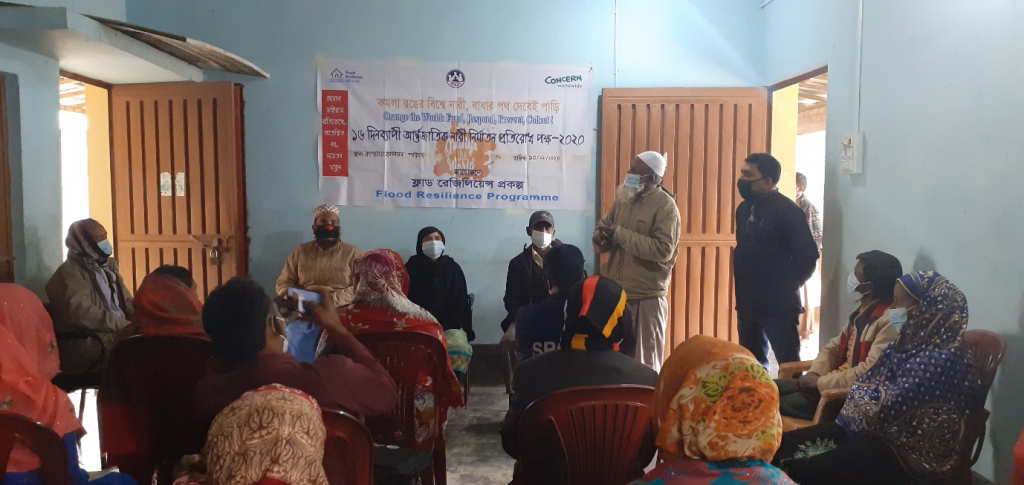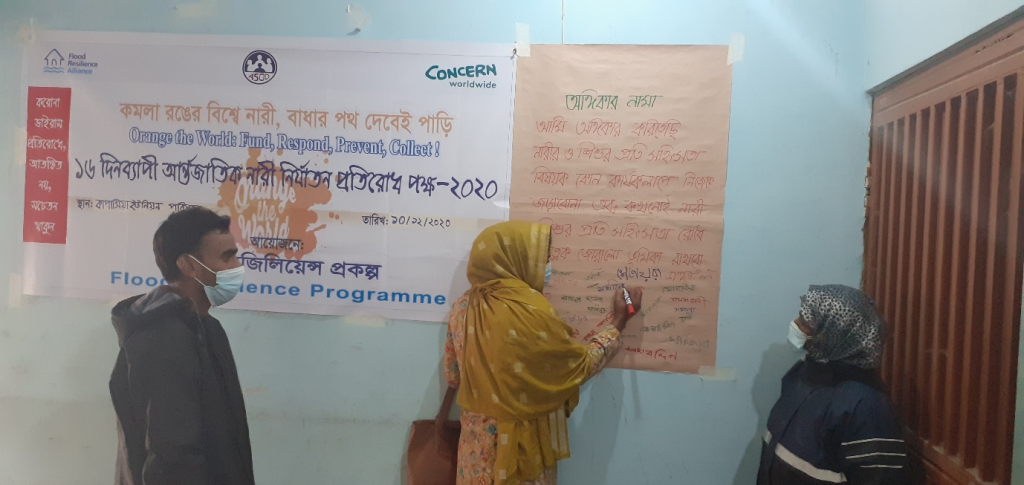As part of the Zurich Flood Resilience Alliance Concern Worldwide works with our local partner Assistance for Social Organization and Development (ASOD) in 22 flood-affected communities in Bangladesh. We know that gender equality and the eradication of gender-based violence is required for resilience, this blog describes how we work to achieve this.
Reasons for, and effects of, gender-based violence in Bangladesh
In Bangladesh, particularly in remote areas, women and girls are often deprived of opportunities for education, employment, ownership of assets and property and are treated as subordinate to men.
Women in these areas are often excluded from decision-making in the household and rarely participate in community decision-making.
This social and gender discrimination creates an environment where violence against women occurs and is tolerated. In turn, violence against women causes further discrimination, as the effects of gender-based violence (GBV) restrict women’s freedoms and participation in society, further perpetuating this negative cycle.
In Bangladesh, almost two thirds of married women have experienced some form of violence by their husband at least once during their marriage.
Gendered experiences of floods
Gender-based violence and threats against women constrain their mobility and participation in community level decision making. This provides a big challenge for our Flood Resilience Project.
Floods impact women differently than men, especially in a gender unequal society. Women are less likely to have a mobile phone to receive early warnings, and often have caring responsibilities that mean they need to consider elderly relatives or children when evacuating.
When building flood resilience we need to consider the priorities and needs of all members of a community, not just those with the most power.
Concern and ASOD are working hard to include women, their knowledge and experiences, in all aspects of the project. We’re particularly focused on ensuring women are present and actively contributing members in Community Resilience Action Groups (CRAGs).

A series of community feedback sessions were conducted in each of the 22 communities where we work in which small groups were consulted following the Flood Resilience Measurement for Communities (FRMC) process. The communities decided they wanted community action groups created to take forward their identified resilience actions, and so the CRAGs were formed.
Increasing prevalence of gender-based violence during the pandemic
Partners working in communities in Bangladesh have observed an increase in gender-based violence since the start of the Covid-19 pandemic. This can, at least partly, be explained by how loss of employment and movement restrictions means male family members are spending more time in the home.
Depression and anxiety over lost livelihoods along with increased time at home has in some cases led men to take out their frustration on the women they live with.
In recognition of this, we used the 16 Days of Activism Against Gender-based Violence campaign from 25th November – 10th December 2020 to highlight the issues faced by women in the communities we work and start building an environment that enables women’s participation in flood resilience building.
What we’re doing to tackle gender-based violence in communities we work with
Concern and ASOD organised a series of dialogues between the Union Parishad (Council) Standing Committee for Women and Child Welfare and the CRAGs. Union Disaster Management Committee (UDMC) representatives also joined the dialogues.
The objective was to capitalise on the efforts of the “16 Days” campaign to reduce gender-based violence and reinforce positive messages to encourage an environment that enables women and girls to engage in community decision making and resilience building.
Examples of messages we promote are the challenging of gender norms such as sharing of household tasks between men and women, inclusive decision-making and denouncing gender-based violence.
This was done through:
a) sensitising the Union Parishad Standing Committee for Women and Child Welfare to address gender-based violence in the communities year-round through collaboration with the CRAGs and;
b) engaging communities to raise their awareness of and responsiveness to gender-based violence.
There are plans to follow up on the outcomes of these activities which have so far been hampered by the increasing spread of Coronavirus in the country.
The dialogues were organised in all 11 Union Councils where we work. Members shared their observations and experiences of gender-based violence with the Standing Committee.

Community members share their experiences of gender-based violence
One UDMC member shared that during the Covid-19 lockdown many male family members in his community became unemployed and were struggling to make a living. He explained that this is what caused many clashes within families and that female family members were faced with violence, both mental and physical as a result.
The Standing Committee of Haripur Union agreed to work to address gender-based violence and to keep the referral service for victims of such violence functional, even throughout the Covid-19 pandemic.
In another dialogue, the Union Council Chairman noted that women do a lot a work for the growth and management of the family, however, they are more deprived and face violence from their male counterparts. He emphasised that men and women need to work together to change the situation and to ensure the same environment for boys and girls in the family.
In a different dialogue, a woman UDMC member expressed her hope that if the Standing Committee and CRAG worked together to reduce gender-based violence, that they could achieve communities without such violence.
Participants at the dialogues were encouraged to sign a ‘Pledge Against Gender-Based Violence’.

How do we end gender-based violence in Bangladesh?
Community based activities to prevent harmful gender stereotypes and superstitions that impact negatively on women and girls, like the ones conducted by Concern and ASOD last year are vital to change the context and social norms that allow and create gender based violence.
Men and boys need to engage in activities that promote women’s equality.
We need initiatives that promote sharing of household chores and unpaid care work at home.
We need to raise the status of women, both the awareness of their rights, and through concrete measures in fields like employment, education, political participation and legal rights.
Women’s literacy needs to be strengthened. Women need knowledge of how to use, and access to, mobile phone communication. For reasons including access to flood early warnings.
We must ensure women know how and where to access information and services in response to gender-based violence, including psychosocial and physical health, and legal services.
When planning and implementing shelters and relevant basic services in response flooding, women’s needs and the increased risk of gender-based violence during disasters must be taken into account.
We need to ensure participation of women, women leaders, women’s networks and organisations, persons with disabilities, adolescents and other vulnerable groups in decision-making and in planning and implementing of responses to floods and other hazards.
Concern is committed to these actions to ensure more equitable societies and that no one is left behind when disaster strikes.
To learn more about the work Concern Worldwide is doing in Bangladesh as part of the Zurich Flood Resilience Alliance visit our Where we work page.

Comments